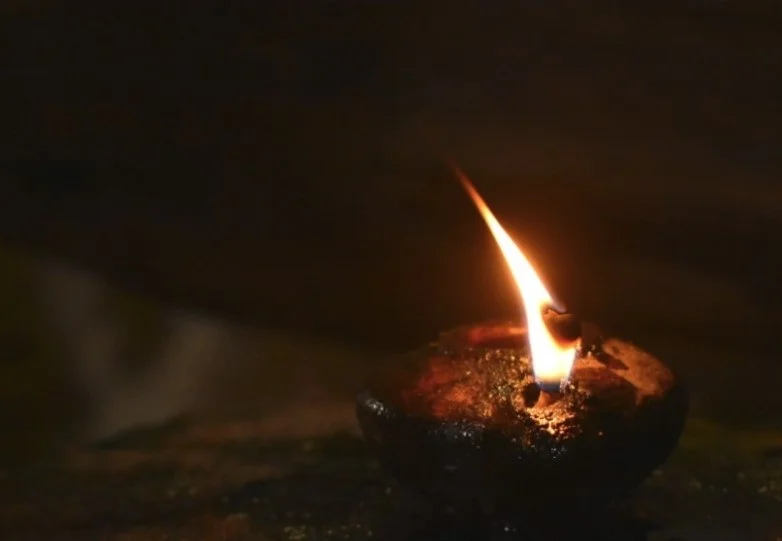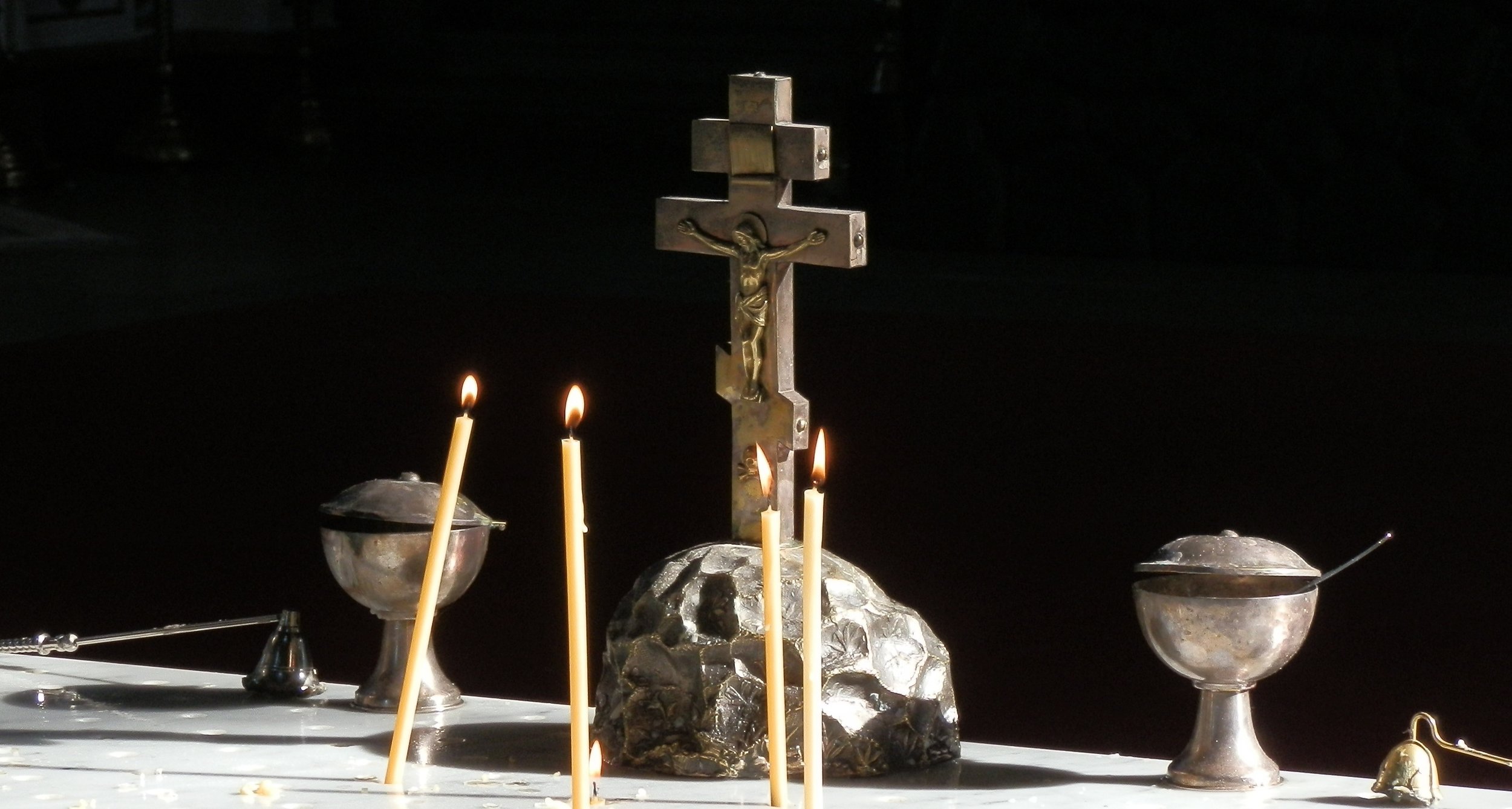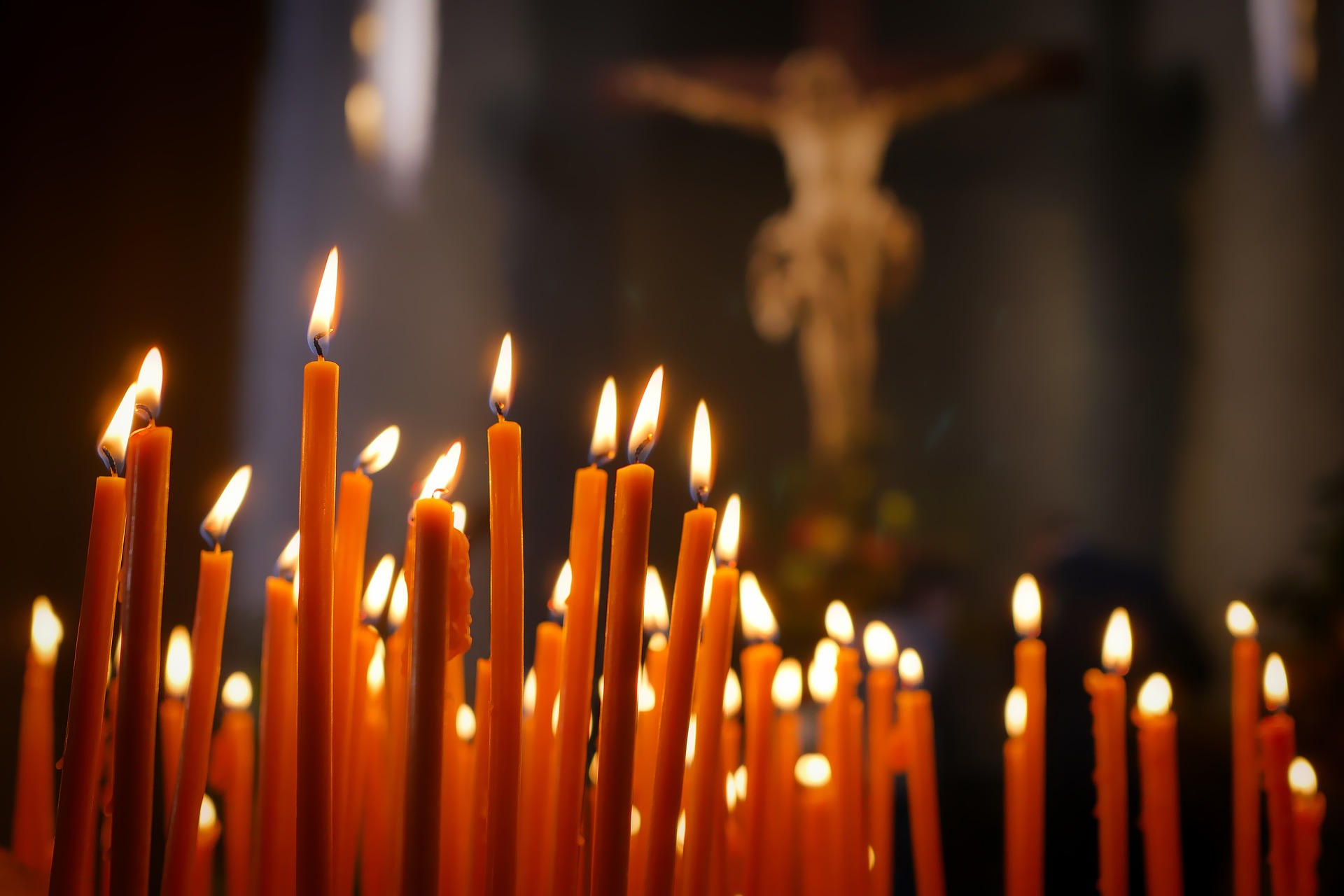Healing Atonement
John Chrysostom of Constantinople (c.349 - 407 AD)
An old clay oil lamp from Nazareth, Israel. Photo credit: Olivia Armstrong.
The Writings of John Chrysostom of Constantinople
John Chrysostom, Homilies on Matthew's Gospel, Homily 27 writes, 'Esaias also spoke of these things; He took our infirmities, and bare our sicknesses. He said not, He did them away, but He took and bare them; which seems to me to be spoken rather of sins, by the prophet, in harmony'
John Chrysostom, Homilies on the Gospel of John, Homily 11 see John 1:14
John Chrysostom, Homilies on Romans, Homily 13 see Romans 8:3
John Chrysostom, Homilies on 2 Corinthians, Homily 11 see 2 Corinthians 5:11 - 21
John Chrysostom, Homilies on Ephesians, Homily 1 see Ephesians 1:6
John Chrysostom, Homilies on Hebrews, Homily 17 see Hebrews 10:2 - 9
John Chrysostom, Homilies on Galatians, Homily 3 see his comments on Galatians 3:10 - 13:
Ver. 10, 11. For it is written, Cursed is every one that continues not in all things that are written in the book of the Law to do them. Now that no man is justified by the Law is evident.
For all have sinned, and are under the curse. However he does not say this yet, lest he should seem to lay it down of himself, but here again establishes his point by a text which concisely states both points; that no man has fulfilled the Law, (wherefore they are under the curse,) and, that Faith justifies. What then is the text? It is in the book of the prophet Habakkuk, The just shall live by faith, Habakkuk 2:4 which not only establishes the righteousness that is of Faith, but also that there is no salvation through the Law. As no one, he says, kept the Law, but all were under the curse, on account of transgression, an easy way was provided, that from Faith, which is in itself a strong proof that no man can be justified by the Law. For the prophet says not, The just shall live by the Law, but, by faith:
Ver. 12. And the Law is not of faith; but He that does them shall live in them.
For the Law requires not only Faith but works also, but grace saves and justifies by Faith. Ephesians 2:8
You see how he proves that they are under the curse who cleave to the Law, because it is impossible to fulfill it; next, how comes Faith to have this justifying power? For to this doctrine he already stood pledged, and now maintains it with great force of argument. The Law being too weak to lead man to righteousness, an effectual remedy was provided in Faith, which is the means of rendering that possible which was impossible by the Law. Romans 8:3 Now as the Scripture says, the just shall live by faith, thus repudiating salvation by the Law, and moreover as Abraham was justified by Faith, it is evident that its efficacy is very great. And it is also clear, that he who abides not by the Law is cursed, and that he who keeps to Faith is just. But, you may ask me, how I prove that this curse is not still of force? Abraham lived before the Law, but we, who once were subject to the yoke of bondage, have made ourselves liable to the curse; and who shall release us therefrom? Observe his ready answer to this; his former remark was sufficient; for, if a man be once justified, and has died to the Law and embraced a novel life, how can such a one be subject to the curse? However, this is not enough for him, so he begins with a fresh argument, as follows:—
Ver. 13. Christ redeemed us from the curse of the Law, having become a curse for us: for it is written, Cursed is every one that hangs on a tree.
In reality, the people were subject to another curse, which says, Cursed is every one that continues not in the things that are written in the book of the Law. Deuteronomy 27:26 To this curse, I say, people were subject, for no man had continued in, or was a keeper of, the whole Law; but Christ exchanged this curse for the other, Cursed is every one that hangs on a tree. As then both he who hanged on a tree, and he who transgresses the Law, is cursed, and as it was necessary for him who is about to relieve from a curse himself to be free from it, but to receive another instead of it, therefore Christ took upon Him such another, and thereby relieved us from the curse. It was like an innocent man's undertaking to die for another sentenced to death, and so rescuing him from punishment. For Christ took upon Him not the curse of transgression, but the other curse, in order to remove that of others. For, He had done no violence neither was any deceit in His mouth. Isaiah 53:9; 1 Peter 2:22 And as by dying He rescued from death those who were dying, so by taking upon Himself the curse, He delivered them from it.
John Chrysostom is teaching penal participation, not penal substitution. His exposition rests on his observation that there are two types of curse experiences. The first type of curse is being fallen and being exiled from the garden of Eden: Our first parents cursed our human nature with the sin-sickness. And it is important to identify Adam and Eve as the cause, because God did not curse us by exiling us. In fact, God exiled humanity not out of retributive justice, but out of love: He did not want people to make their sinfulness immortal by eating from the Tree of Life while in a corrupted state.
The second type of curse is being under the Sinai covenant, which required faithfully following all its commandments, lest Israel be exiled in its own peculiar way which echoed the original exile from the original garden.
John Chrysostom’s argument implies that in Dt.21:22 - 23, hanging a person on a tree didn't make him cursed. It identified him as already cursed. Compare the "rebellious son" language of Dt.21 to Cain in Gen.4, the ultimate "rebellious son." Cain further cursed his own human nature — further than his parents Adam and Eve did by corrupting it initially. We can see that in the text of Genesis because Cain could no longer work the land and bring forth life from it (Gen.4:11). But everyone else *could* work the land. Which means it was not the land per se that was cursed. It was Cain's human nature. Cain further corrupted his own human nature by killing Abel, i.e. becoming a death-dealer when God had called him to be a life-bringer. God doesn't curse us. We curse our own human nature. Because we are human beings - human becomings, and because we can go very far in the wrong direction.
Thus, Jesus participated in the curse of bearing a fallen human nature. He did not participate in the curse of breaking the Sinai covenant because in fact he fulfilled it and followed the commandments faithfully, unto perfection.
This is not Penal Substitution as Calvin defined it. Calvin said that Jesus on the cross received the retributive justice of God, where retributive justice is thought of as an attribute of God. John Chrysostom, by contrast, is saying that Jesus participated in our fallenness in order to successfully internalize the commandments of the Sinai covenant, so that by sharing in our fallen human nature, we could share in his healed human nature — a human nature that was no longer cursed by Adam and Eve’s fall.
John Chrysostom, Homilies in Praise of Paul, Homily 1, paragraph 15 says, "For he ran through the whole world just as though he were wind and fire, and purified the earth." From Margaret M. Mitchell, The Heavenly Trumpet: John Chrysostom and the Art of Pauline Interpretation (Amazon book, 2002), p.447; in connection with paragraph 3 when he says that Paul offered himself as a sacrifice, to "put to death his fleshly nature," showing that the ceremonial-sacrificial system was for purification.
John Chrysostom, Homilies in Praise of Paul, Homily 2, paragraph 9 says, "For how is it not marvelous and incredible that a word which leapt forth from a tongue of clay sent death fleeing, destroyed sin, set straight an incapacitated nature, and made the earth into heaven?" (found in Margaret M. Mitchell, The Heavenly Trumpet: John Chrysostom and the Art of Pauline Interpretation (Amazon book, 2002), p.451
More Resources on John Chrysostom of Constantinople
David Bradshaw, No Repentance After Death: Facing Hard Questions about Salvation. Orthodoxy and Heterodoxy | Ancient Faith, May 26, 2020. Bradshaw examines Clement of Alexandria, Gregory of Nyssa, John Chrysostom, Theophylact, Dorotheus of Gaza, Dionysius the Areopagite, and Maximus the Confessor.
Sources of Atonement Theology
These resources explore the foundation of “Medical Substitution” as the best understanding of the Bible, and the original understanding of the church. There are also links to books, web articles, etc. from representatives of the three broad Christian traditions.





